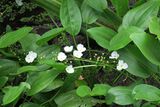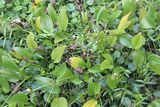Echinodorus palaefolius (Ness & Mart.) J.F. Macbr.

| light: | a lot - medium |
|---|---|
| temperature: | 22-28°C |
| growth: | fast |
| location: | background |
| height: | up to 50 cm |
| pH: | 5-8 |
| water hardness: | soft to hard |
| Co2: | 20-30mg/L |
| propagation: |
Wrong spelling of : Echinodorus palifolius (Nees & Mart.) J.F.Macbr.
Synonym of: Aquarius palifolius (Nees & Mart.) Christenh. & Byng
Synonyms:
Echinodorus ellipticus var. minus (Seub.) Micheli
Echinodorus ellipticus var. latifolius Micheli
Alisma ellipticum Mart. ex Schult.f.
Alisma ellipticum var. minus Seub.
Alisma palifolium (Nees & Mart.) Kunth
Alisma nathpurense Steud.
Sagittaria palifolia var. heterophylla Kuntze
Sagittaria palifolia Nees & Mart.
Sagittaria palifolia var. macrophylla (Kunth) Kuntze
Sagittaria palifolia var. elliptica (Mart. ex Schult.f.) Kuntze
Sagittaria palifolia var. undulata Kuntze
This is a marsh plant native to the eastern regions of Brazil. It often goes by another name, Echinodorus argentinensis, which in turn is a synonym for Echinodorus grandiflorus. The latter is rarely found in the aquarium hobby. Such confusion leads to completely different and very different looking plants appearing under one and the same name. The true Echinodorus palifolius can grow both under water and on land in a moist environment or partially submerged in water. Under water, the leaf blades can be lanceolate or ovate and have relatively short petioles. Young shoots often have a reddish coloration. In the air, the leaves become oval, the leaf stalks become broader and thicker and acquire ribs that make them stiff. The above-ground shoots look similar to those of Echinodorus cordifolius and differ only in the inflorescences. In Echinodorus palifolius, the scoop flowers are 2-2.5 cm in size and have 12 pale yellow stamens and narrow petals, the flowers are larger - up to 3 cm with 15-26 stamens.For normal growth, the plant requires warm, soft, slightly acidic water, nutrient-rich soil and plenty of light. It can be cultivated in both aquariums and paludariums. In the latter case, the bushes grow up to half a meter high. The plant is much smaller under water.





